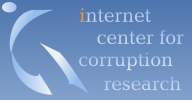| Number |
1 |
2 |
3 |
| Source |
World Economic Forum |
| Name |
Global Competitiveness Report |
| Year |
2001 |
2002 |
2003 |
| Who was surveyed? |
Senior business leaders; domestic and international companies |
| Subject asked |
Undocumented extra payments connected with import and export permits, public utilities and contracts, business licenses, tax payments or loan applications are common/not common. |
In addition to questions mentioned on the left:
payments connected to favorable regulations and judicial decisions |
| Number of replies |
4,022 |
ca. 4,600 |
7,741 |
| Coverage |
59 countries |
76 countries |
102 countries |

|
| Number |
4 |
5 |
6 |
| Source |
Institute for Management Development, IMD, Switzerland |
| Name |
World Competitiveness Yearbook |
| Year |
2001 |
2002 |
2003 |
| Who was surveyed? |
Executives in top and middle management; domestic and international companies |
| Subject asked |
Bribing and corruption exist in the public sphere |
Bribing and corruption exist in the economy |
| Number of replies |
3,678 |
3,532 |
> 4,000 |
| Coverage |
49 countries |
51 countries |

|
| Number |
7 |
8 |
| Source |
Information International |
World Bank |
| Name |
Survey of Middle Eastern Businesspeople |
World Business Environment Survey |
| Year |
2003 |
2001 |
| Who was surveyed? |
Senior businesspeople from Bahrain, Lebanon and UAE |
Senior managers |
| Subject asked |
How common are bribes, how costly are they for doing business and how frequently are public contracts awarded to friends and relatives in neighboring countries |
"Frequency of bribing" and "corruption as a constraint to business" |
| Number of replies |
382 assessments from 165 respondents |
10,090 |
| Coverage |
31 countries |
79 countries1 |
| 1The survey was carried out in 81 countries, but data for two countries was insufficient. |

|
| Number |
9 |
10 |
11 |
| Source |
Economist Intelligence Unit |
Freedom House |
World Markets Research Centre |
| Name |
Country Risk Service and Country Forecast |
Nations in Transit |
Risk Ratings |
| Year |
2003 |
2003 |
2002 |
| Who was surveyed? |
Expert staff assessment (expatriate) |
Assessment by US academic experts and FH staff |
Assessment by staff |
| Subject asked |
Assessment of the pervasiveness of corruption (the misuse of public office for private or political party gain) among public officials (politicians and civil servants) |
Perception of corruption in the civil service, the business interests of top policy makers, laws on financial disclosure and conflict of interest, and anticorruption initiatives. |
Red tape and the likelihood of encountering corrupt officials. This includes small-scale bribes, larger-scale kickbacks and corporate fraud. |
| Number of replies |
Not applicable |
Not applicable |
Not applicable |
| Coverage |
139 countries |
27 transition economies |
186 countries |

|
| Number |
12 |
13 |
14 |
| Source |
Columbia University (CU) |
Political & Economic Risk Consultancy |
PricewaterhouseCoopers |
| Name |
State Capacity Survey |
Asian Intelligence Issue |
Opacity Index |
| Year |
2002 |
2001 |
2001 |
| Who was surveyed? |
US-resident country experts (policy analysts, academics and journalists) |
Expatriate business executives |
CFOs, equity analysts, bankers and PwC staff |
| Subject asked |
Severity of corruption within the state |
How do you rate corruption in terms of its quality or contribution to the overall living/working environment? |
Frequency of corruption in various contexts (e.g. obtaining import/export permits or subsidies, avoiding taxes) |
| Number of replies |
224 |
ca. 1,000 |
1,357 |
| Coverage |
95 countries |
14 countries |
34 countries |

|
| Number |
15 |
16 |
17 |
| Source |
A Multilateral Development Bank |
Gallup International on behalf of Transparency International |
World Bank and the EBRD |
| Name |
Survey |
Corruption Survey |
Business Environment and Enterprise Performance Survey |
| Year |
2002 |
2002 |
2002 |
| Who was surveyed? |
Experts within the bank were identified and multiple questionnaires (each relating to a different country) were sent out to them. Roughly 40% of the questionnaires were returned. |
Senior businesspeople from 15 emerging market economies |
Senior businesspeople |
| Subject asked |
How widespread is the incidence of corruption? (Widespread; Somewhat widespread; Somewhat limited; Limited; No judgment) |
"How common are bribes to politicians, senior civil servants, and judges" and "how significant of an obstacle are the costs associated with such payments for doing business?" |
Frequency of irregular "additional payments"; how is corruption for the operation and growth of your business? |
| Number of replies |
398 |
835 |
6500 |
| Coverage |
47 countries |
21 countries |
25 transition countries |

